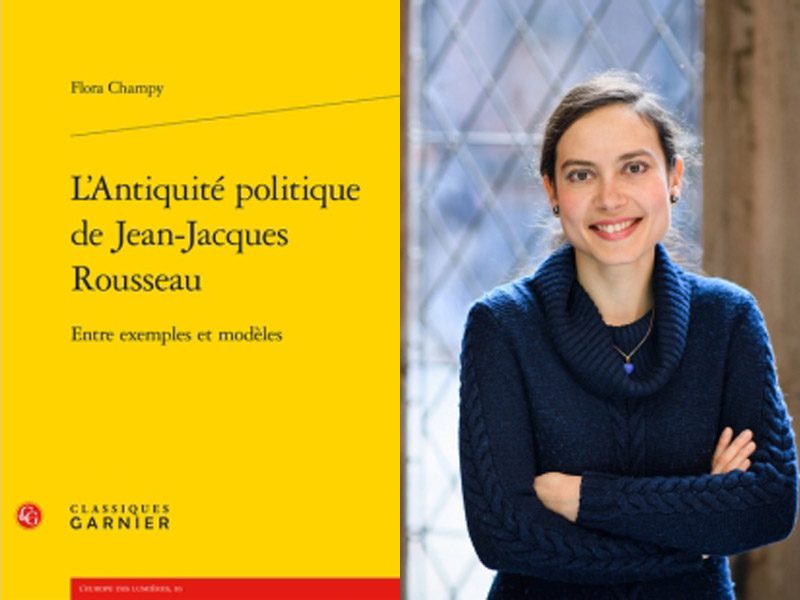Flora Champy is Assistant Professor of French and Italian. Her book “L’Antiquité politique de Jean-Jacques Rousseau” was published on January 26, 2022 by Classiques Garnier.
How did you get the idea for this project?
The project sprang from my experience as a reader of Rousseau. When finding many echoes of stoicism in Rousseau’s thought, I initially envisioned a comparative study of Seneca’s and Rousseau’s conception of legitimacy. As I started the research process, I realized that Rousseau’s interpretation of stoicism is better understood within the broader context of his relationship to the Ancients. While many commentators, including Rousseau himself and his contemporaries, have highlighted the prevalence of ancient examples in his political writings, these are most often dismissed as the mere shallow result of an unreflective admiration for a fantasized past. Rousseau’s political writings have never given me this impression. I decided to elucidate my reading experience by examining more closely the role ancient examples play in his argument.
How has your project developed or changed throughout the research and writing process?
A lot! This is very much an empirical project: I started researching the material without a preconceived analytical framework. The groundwork for this project is a good old Quellenforschung, or inquiry on the sources, for every reference to Antiquity in Rousseau’s political writings. This made me realize three things: first, that Rousseau, despite his reputation as a book-hater, read widely and conscientiously, methodically documenting himself for his purposes; then, that Antiquity can mean different things for him; and finally, that he is by no means subservient to his sources, freely using and rewriting them as best fits his argument. This required me to supplement my initial literary work on intertextuality with further interdisciplinary research. I thus incorporated historical analysis, to better situate Rousseau’s reading practices in his time, and political theory, to understand how his examples relate to key notions in his system such as popular sovereignty, the general will, and common interest. At this point, I identified the notions of “example” and “model” as the theoretical framework most relevant to depict Rousseau’s relationship to ancient material. During the course of his career as a political writer, Rousseau shifted his focus from major individual figures, such as Fabricius or Cato the Younger, to the overall political structure of the city-state. While I initially contrasted these two ways of apprehending Antiquity, when revising my dissertation for publication, I emphasized the connections between them.
What questions for future investigation has the project sparked?
Historically, most scholars focus on the first part of the Social Contract while ignoring the last two books, and the section on Roman institutions in particular is often dismissed as inessential. It is my hope that this book will inspire readers to finally consider and study the Social Contract as a whole. Moreover, examining how examples from Antiquity are reworked and rewritten could be expanded both to other Early modern authors, such as Machiavelli and Montesquieu, and to Rousseau’s non-political writing. I would be thrilled if other scholars found the notions of example and model applicable to other major figures in the history of political philosophy. Finally, my book opens the path to explore more in-depth the concrete mediations (editions, translations, but also cultural practices and traditions) that allowed the Enlightenment philosophers to engage with Antiquity.
Why should people read this book?
It is my hope that my book will appeal to political theorists, literature scholars and historians alike. Readers of the Social Contract puzzled by the technical chapters on Roman institutions will find, hopefully, that this section illuminates the more abstract concepts developed in the first part of the book, and that Rousseau’s choice of the Roman Republic over Sparta as his main political model is highly consequential. Students and scholars interested in Rousseau overall will gain a comprehensive account of how his political oeuvre developed, as well as a better understanding of how his reading, writing and thinking process intertwine. More broadly, the book provides a case study of how knowledge circulated and meaning was created in pre-Revolution France. It sheds a new light on the crucial role exemplarity played in Early modern culture, and how seminal it was for the Enlightenment.
Learn more about other publications by Princeton University faculty in the humanities by exploring our Faculty Bookshelf.
















